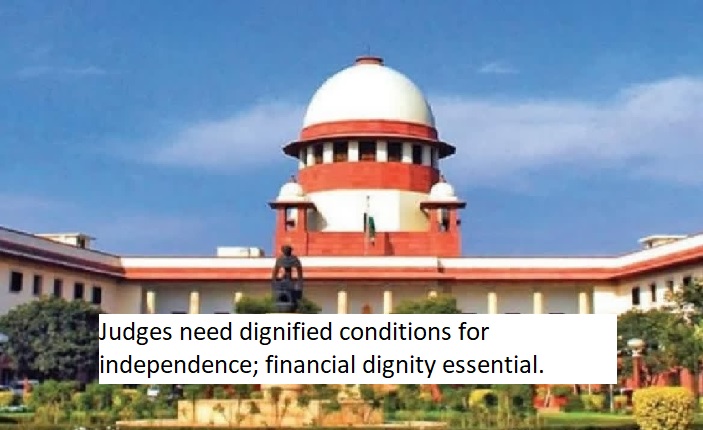


In its recent ruling on November 30, 2023, in the case of All India Judges Association v. Union of India, the Supreme Court reiterated the critical importance of providing dignified working conditions for judicial officers, both during their active service and in their post-retirement phase. The case revolved around the implementation of salary increments for judicial officers, as recommended by the Second National Judicial Pay Commission (SNJPC).
Emphasizing the nexus between adequate allowances for judges and the safeguarding of judicial independence, the court stressed that financial dignity played a pivotal role in upholding the public's trust in the rule of law. The court's order highlighted the intricate relationship between the demanding nature of judicial duties, the need for financial dignity, and the preservation of judicial independence.
The Apex Court, led by Chief Justice DY Chandrachud and Justice JB Pardiwala, underscored that the judicial service is a fundamental element of the state's functioning and is integral to maintaining the Rule of Law. It emphasized the distinct responsibilities of district judiciary officers in ensuring the fair dispensation of justice to citizens.
The court asserted that the state bears the responsibility of ensuring that the working conditions and post-retirement benefits for judicial officers align with the requirement for dignity. The order made it clear that this duty is not limited to the duration of a judge's active service but extends to their retirement, ensuring a continuation of dignified living for former judicial service candidates.
Highlighting the strenuous nature of the work performed by judicial officers, the court rejected the notion that a judge's duties should be confined solely to court working hours. It acknowledged the extensive administrative functions undertaken beyond regular working hours, including case preparation, judgment drafting, and various administrative responsibilities. The court dispelled the misconception that a judge's performance should be assessed solely based on courtroom activities.
Addressing potential financial concerns raised by the States, the Supreme Court dismissed the argument that increased expenditure for maintaining proper conditions of service was a justifiable defense. It emphasized that judicial officers commit a significant portion of their working hours to the institution, limiting opportunities for legal work outside their official duties. The court held that the state, under an affirmative obligation to ensure dignified working conditions, cannot reasonably cite financial burden as a justification, considering the substantial dedication of judicial officers to their roles.
In conclusion, the Supreme Court's order serves as a resounding affirmation of the imperative to provide dignified working conditions for judicial officers, recognizing the integral role they play in upholding the rule of law. The ruling establishes a clear link between financial dignity, judicial independence, and public trust in the judiciary, emphasizing the state's duty to ensure appropriate conditions of service for judges throughout their careers and into retirement.
TAGS: Supreme Court All India Judges Association v. Union of India judicial officers working conditions financial dignity